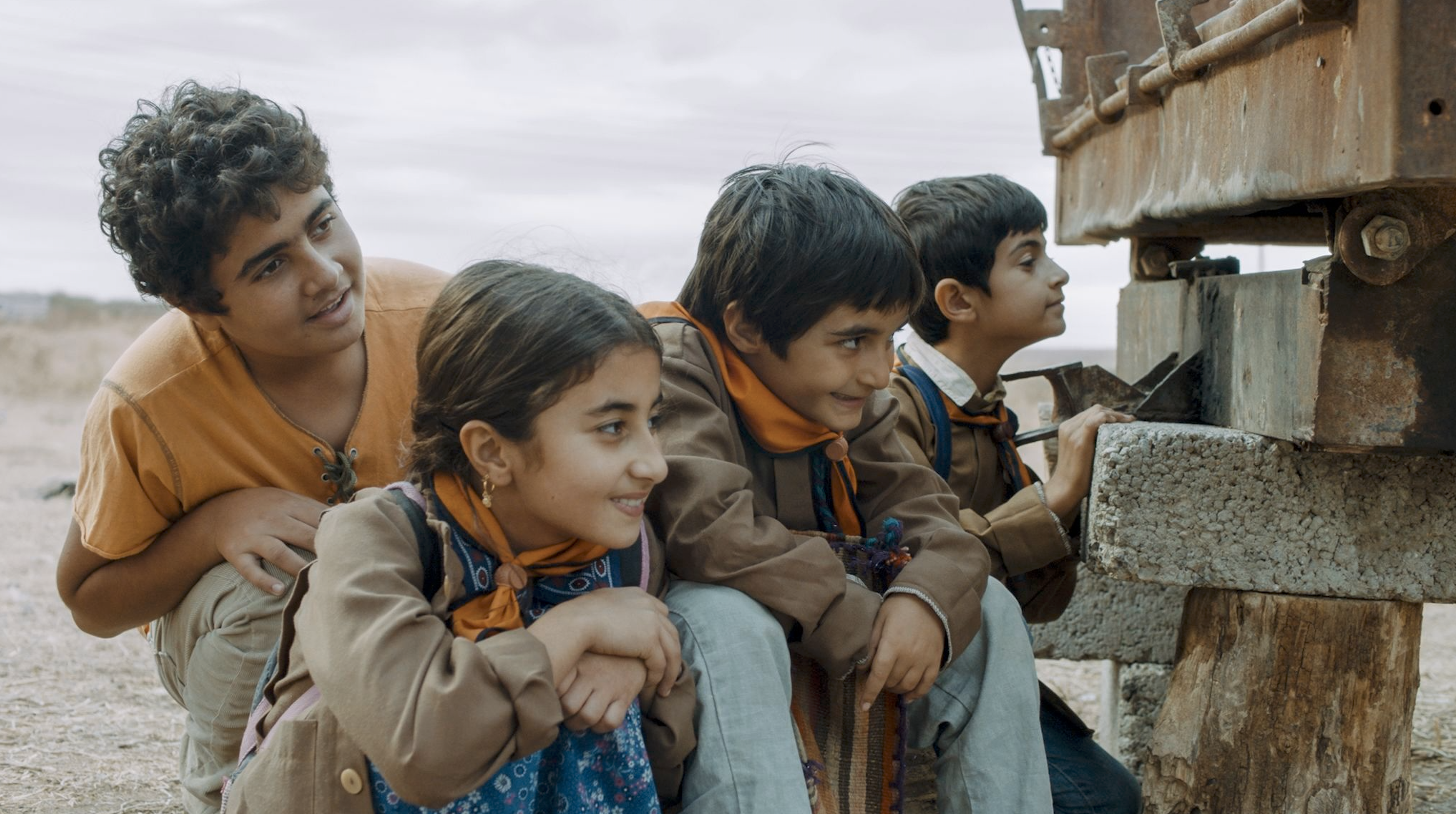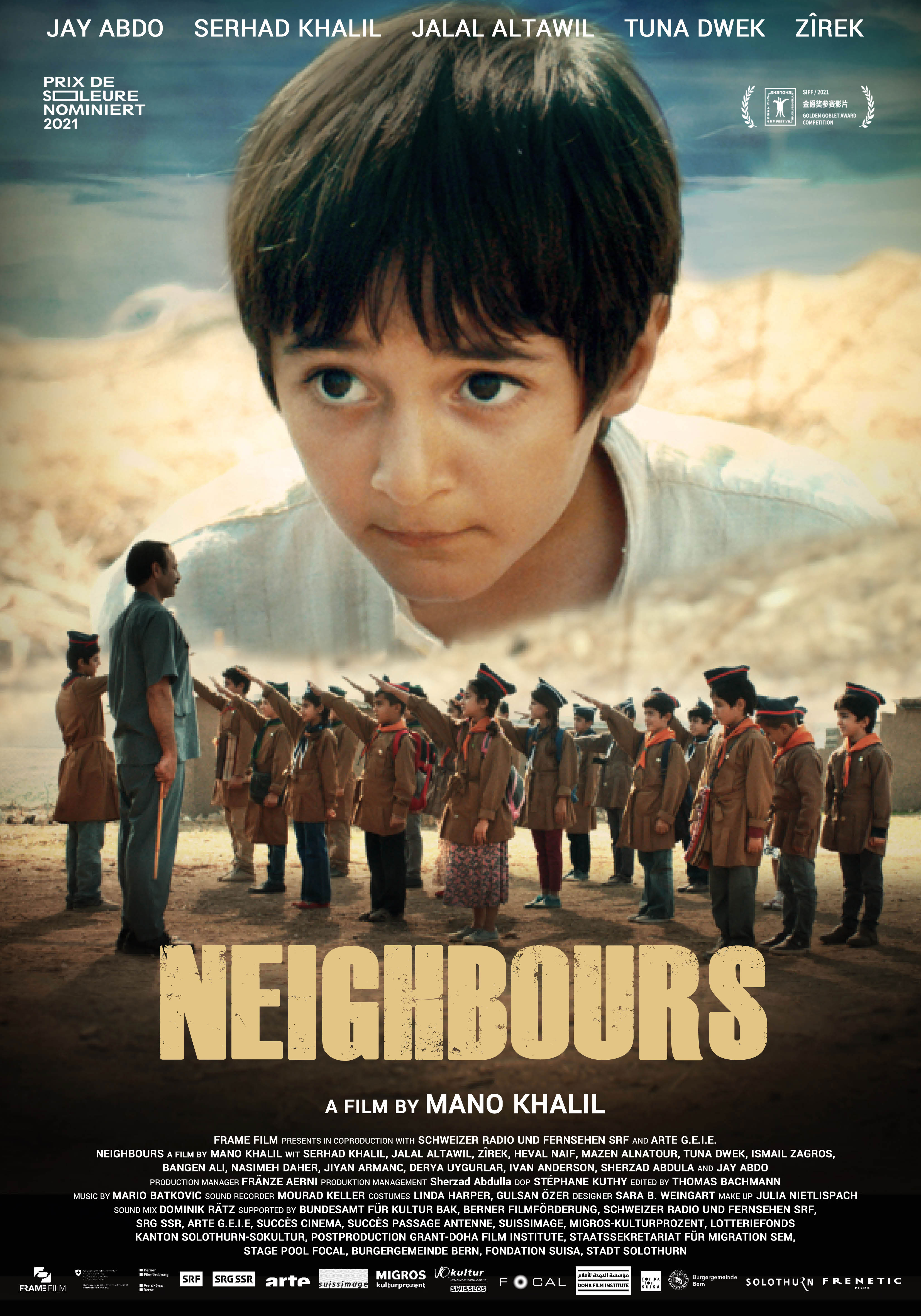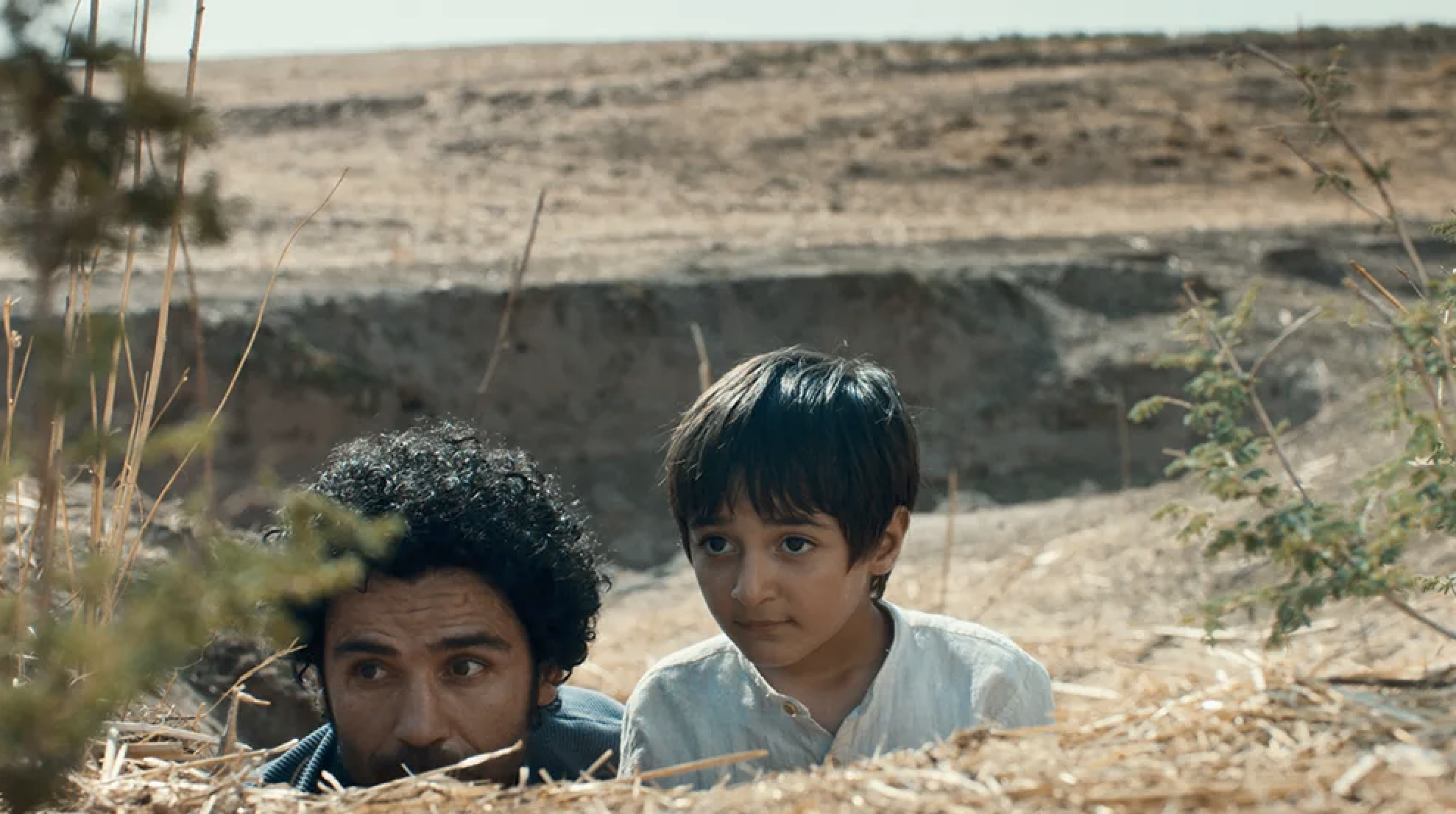“Neighbours,” directed by Mano Khalil, is a thought-provoking drama-fiction film that explores the theme of human dignity. Taking place in a village on the Syrian-Turkish border in Western Kurdistan during the 1980s, the movie presents a diverse and harmonious community consisting of Muslim Kurds, Yazidis, Jews, and Christians.
Type: Drama-Fiction
Duration: 124 mins
Release Date: October 14, 2021
Producing Country: Switzerland

The residents of a village on the Syrian-Turkish border in Western Kurdistan, who include Muslim Kurds, Yazidis, and some Jewish and Christian families, live a harsh life of daily struggle but one that is without problems, hatred, or violence until the day a racist, fascist teacher is transferred to the village school and begins penetrating the various groups and ethnicities and spreading bigotry and distrust among the village’s neighbors. The six-year-old Kurdish boy Sero experiences his first school year in an Arab school and watches his small world radically overturned by an absurd variant of nationalism. In multi-colored Syria, a Syria of Kurdish, Ara, Armenian and Jewish nations, village school teachers prohibit children from speaking Kurdish and force them to express their love and affection for the Syrian Ba'ath regime, Hafez Al-Assad, the Ba'ath Party, and the Arab nation. Humorous yet serious, the film explores themes of childhood while providing light moments nestled between dark drama and dictatorship.
This is a summary of Neighbours, the film by Swiss-based Kurdish film director Mano Khalil based on his experiences living in Syria 25 years ago. After releasing “The Swallow\Die Schwalbe” in 2016 and attracting a sizeable following, Neighbours is Khalil’s latest production and has been screened in Switzerland, Europe, and other countries around the world over the past two years. It has won several awards, with dozens of blogs and articles having been written about it in different European languages across many popular online newspapers, journals, and websites.
Neighbours is set in Western Kurdistan in the 1980s under the rule of the Syrian Ba'ath regime, at a time when the state is seeking to eradicate the language, culture, and traditions of the Kurdish people and stir up conflict between the followers of Islam, Christianity, Judaism, and Yazidism. During these dark, oppressive, and tyrannical days, the six-year-old Sero, a Kurd, has a heart free from guile and evil and full of hope, while he eagerly awaits for his village to be connected to the electricity grid so that he can watch cartoons. Meanwhile, he is also waiting for the teacher to arrive at his school to teach him how to read and about the world outside his village. But Sero’s imagination is swiftly destroyed, as his life turns into mess under the grating pressure of the Syrian regime.
Neighbours is the first film set in Syria and in Kurdish cinema to depict the racist policy of the Syrian Ba'ath regime against the Kurdish people over the past 60 years. In doing so, it expertly draws attention to a dark period of history for the Kurds who lived under this centralized, cruel system.

The director’s journey
Director Mano Khalil presents a series of topics and events to the audience in Neighbours but, as he pointed out in several media briefings, the content of the film can be summarized in two words: human dignity. All other terms – respect, sacrifice, love, brotherhood, and coexistence – are but narrow streams and creeks flowing into the broad river of the human spirit, which is the dignity of man. Humans may experience difficulties or other unsolvable dilemmas and then forget the pain over time, but nothing can compensate for the loss of dignity. From this point of view, Khalil accentuates a fundamental theme of human life in this film, the need to respect people's different backgrounds and beliefs in religion, culture, politics, social status, and nationality.
The basis for the film emerged in the mid-1980s, when Khalil was a student at the College of History and Law in Damascus and recorded his impressions and the film’s scenario. Then, in 1986, Mano moved to Czechoslovakia to study filmmaking and cinematography. Having escaped from what he felt was a large, dark and closed prison, he inhaled and absorbed the breeze of freedom for the first time in his life. Shortly after his move, he realized that respect and human dignity form the basic principles of human society. This led him to compare the Czechoslovakian and Syrian communities, and as a result of his new perspectives, he repeatedly re-evaluated and reviewed the content of the film's script and filled in the gaps, while dreaming of having an opportunity to make a cinematic film for the whole of humanity.
After two and a half decades of directing many films, all of which have attracted the attention of the audience and the cinematic and cultural centers of countries like Switzerland and the whole Europe, Khalil gained the experience and courage to direct, produce, and film Neighbours.
In planning where to shoot the film, Khalil first targeted a village between western Kurdistan (Syria) and northern Kurdistan (Turkey), which residents of both sides call Sarkhat and Binkhat. But after careful and diligent planning, he realized that taking a group of 100 people to western Kurdistan and providing them with accommodation and daily necessities would be an enormous expense. He thus shifted to building a village in the Kurdistan Region similar to one in the Jazira region of western Kurdistan. In an interview, Khallil takes pride in the professionalism of the film’s actors. Jay Abdo, Mazen Al- Natour, Jalal al-Tawil, Syrian Brazilian actress Tuna Dwek, and Kurdish actors such as Ahmed Zirek, Ismail Zagros, Bangen Ali and Heval Naif are among his main crew. He is especially impressed with the exceptional performance of six-year-old Sarmad Khalil, who plays Sero.
Finding the appropriate clothing and accessories for 1980s western Kurdistan was another huge challenge for the production staff, but after a year of research and preparation, the staff managed to bring 3,000 pieces of representative items from Europe to the filming site in the Kurdistan Region.

Mano Khalil
Cameraman, director, and screenwriter Mano Khalil was born in 1964 in Qamishli, western Kurdistan. He studied History and Law at the University of Damascus from 1981 to 1984 and the art of directing in the Film and TV School of the Academy of Performing Arts at Prague University in Czechoslovakia from 1987 to 1994. After completing his studies, he first worked as an independent freelance cameraman for Czech television and later in Slovakia. Khalil has been living in Switzerland since 1996 and founded the Frame Film company in 2012. In 1998, he directed his first film called Triumph of Iron using simple techniques and a low cost of only 66 Swiss francs. In 2000, this film was awarded The Solothurn Film Festival of Switzerland and was nominated for the Swiss Film Award that was broadcast on official Swiss television that year. Before Triumph of Iron, Khalil directed and produced a number of documentaries. The documentary film Al Anfal: In the Name of Allah, Baath and Saddam (Al-Anfal – im Namen von Allah, Baath und Saddam), which Mano produced for Swiss TV in 2005, was an effective reason to introduce the crime of the Anfal genocide to European audiences.
A Selection of Mano Khalil’s Filmography
- My God, 1990, 20-minute short film for Czechoslovakia TV.
- The Place Where God Sleeps, 1992, 30-minute documentary for Czechoslovakia TV.
- Cinema Eye, 1995, 20-minute documentary for Slovak TV.
- Triumph of Iron, 1998, 30-minute short film.
- Bunte Träume, 2003, 52-minute film, produced by Khalil, SRF Schweizer Radio und Fernsehen.
- Al Anfal: In the Name of Allah, Baath and Saddam\ Al-Anfal – “im Namen von Allah, Baath und Saddam,2005, documentary.
- David der Tolhildan, 2006, 54-minute documentary, produced by Khalil, SRF Schweizer Radio und Fernsehen, RTS Radio Télévision Suisse, RSI Radiotelevisione svizzera.
- My Prison, My Home, 2009, 33-minute documentary.
- Our Garden of Eden, 2010, 97-minute documentary, Produced by Khalil, SRF Schweizer Radio und Fernsehen, RTS Radio Télévision Suisse, RSI Radiotelevisione svizzera, 3sat Zürich.
- The Beekeeper, 2013, 107-minute documentary.
- The Swallow\Die Schwalbe, 102-minute fiction film.
- Hafis & Mara, 2018, 88-minute documentary.
- Neighbours, 2021, 124-minute fiction film.
Baker Schwani is a Kurdish writer and translator based in Germany. He has translated several acclaimed novels into Kurdish. Schwani was born in Kirkuk and studied geology in Baghdad before moving to Germany and obtaining a degree in oriental studies at the University of Bonn.

